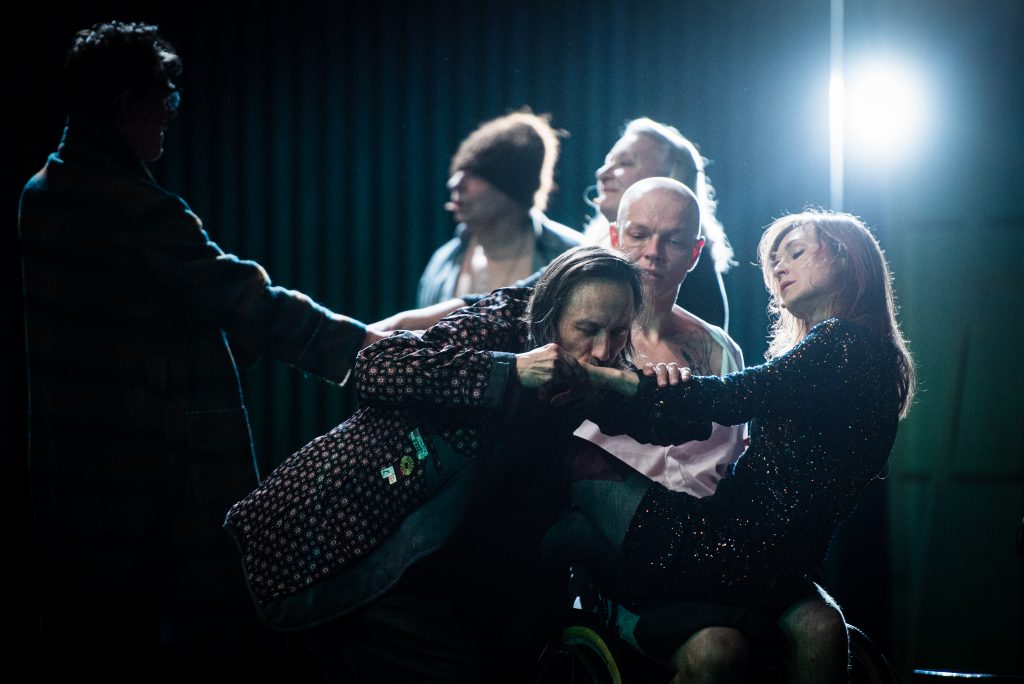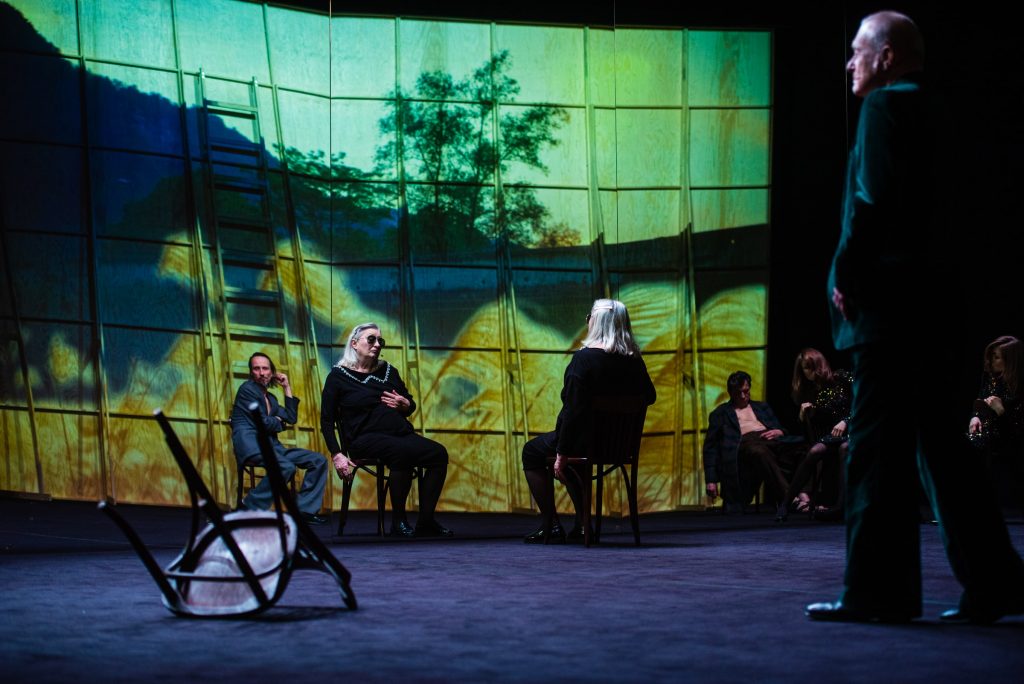“We have the tendency to make the past always more beautiful than the present. It’s a big mistake. So I started more and more to read this play as a metaphor for unfulfilled nostalgia for a promised land, a lost paradise, a unfulfilled love, a better life” – says Luk Perceval the director of “3STRS”.

Roman Pawłowski: It’s hard to believe that you stage „Three Sisters” for the first time. Earlier you directed other Chekhov plays: “The Seagull”, “Ivanov”, “Platonov” and “The Cherry Orchard”, the latter even twice. Why have you been waiting so long for an occasion to stage this play
Luk Perceval: Good question. I always thought it’s a play I couldn’t do, because the central phrase in the play – ”To Moscow, to Moscow” became very dubious in our time. First of all, it’s not so difficult to go to Moscow in the meantime (not during pandemic of course) but you can easily fly, it’s not in our imagination something unreachable. Moscow – it’s more something where you don’t want to go…. So, that was constantly in my head: “How do we find a way to work around with this phrase? How can we give this phrase a sense?”.
RP: Why did you change your mind?
LP: You changed my mind, because you gave me this wonderful tip to read a book “The Nostalgia Factory” by the Dutch author Douwe Draaisma and there I discovered how nostalgia until last century made people really sick, and I think it’s still making people sick. He is describing how soldiers in the Napoleon time, got really sick of nostalgia and how the first colonists who went from Holland to Australia, became even crazy of it. They wanted to fly every few years back to Holland to see their old native village, but then they discovered, that there was nothing left. So it became more and more interesting for me that this “Moscow, Moscow” was a kind of idyll, a dream of our youth we all have, dream about innocence, about a perfect world, where everything is still available, possible, naïve and unpolluted. The nostalgia we all have about the past.
We have the tendency to make the past always more beautiful than the present. It’s a big mistake. So I started more and more to read this play as a metaphor for unfulfilled nostalgia for a promised land, a lost paradise, a unfulfilled love, a better life. The more we are rehearsing and searching with the actors for the meaning of this words, the more I discover every character in this play is carrying with him or her this lost paradise.
RP: One of the consequences of this decision is that the characters are much older than in the original play. How does the problem of aging refer to the concept of the lost paradise?
LP: It’s for me amplifying the pain in the sense that you see the people in their 50s, 60s, even 70s who are saying that their life is ending and that there are less and less possibilities for the future. Vershinin says: “In two or three hundred years’ time life on this earth will be unimaginably beautiful and wonderful…” We are living in a society which is becoming older, I myself I am becoming older , and are confronted with the reality of life that is ending. That is something which is more present in the older age than when you are thirtyfive. I always have this reaction when I see a play of Chekhov played by people in their 30s, 40s, who say: ”One day everything will be better”. I think: “Yeah, one hundred years ago when the text was written, people lived only forty, maximum fifty years and they were old at that moment when they said that. But today in your 30s or 40s you are in the middle of your life, still have possibilities. As a spectator I think at that moment : “Don’t be so self-piteous in your 30s”.
When this phrase about future is said by someone who is older it gets a more contemporary meaning because then it’s not only dealing with aging but also with an old society.

RP: The only young character in your interpretation is Natasha, Andrey’s wife who comes from Ukraine. What is her role in the dramaturgy?
LP: Natasha is a kind of a new “Gastarbeiter”, somebody who is coming from abroad to work here. She’s for me a symbol of new times in Europe. We’re living in an old culture which has been surviving economically through refugees, foreigners, people coming from abroad who are doing the jobs we don’t want to do anymore.
RP: If they are needed, why they become so often object of xenophobia and hate?
LP: Because Europe is more and more nationalist, and to my opinion this has a lot to do with aging. The older we are the more conservative we become, the more need for protection we have, for safety. You can see that not only in Europe, but worldwide: in America, Russia. At one hand the situation of humanity is becoming better, there is less starvation, less poverty, better health care and so on, it is statistically proven. We’re living in a better world, more and more, not good enough yet but better. At the same time this leads to the fact that we are becoming older because the living condition are becoming better. The older the world becomes the more conservative the population is. And you can see that not only on the political level but also in arts.
RP: What did you discover in “Three Sisters” so far that you didn’t expect?
LP: The importance of sexuality. That was for me in the beginning something I was not even thinking of. The more I work with this text, I see that these three women have an enormous need to find a sexual freedom which they are not able to gain. It’s actually only Natasha who is living this sexual freedom because in the play they constantly say about her: “Yeah, she probably has something with the neighbor.” She is the one who is living the life, she wants, she decides for herself, she is taking responsibility, she is doing the job. At the end she is also drunk and unhappy but at least she is living her dreams. And the others are not.
When you see these men, they are more or less impotent. Even Vershinin in our version says: „Sorry, I’m sitting in a wheelchair, it’s not possible anymore”. At the same time there is this natural force of sexuality, the natural need to feel released. Buddhism says that in sexual climax we touch a form of enlightenment because then mind and body become one. Before and after we live in a duality between what we feel and what we think. We are constantly living in a kind of schizophrenic reality. That’s why sexuality is extremely exploited by our society, because we constantly live with this sexual melancholy, this need for a kind of forgetting our depression about the impermanence of life, this wanting to release, wanting to live in a natural “high”, letting yourself fall, going back to the womb of the mother, Moscow…
RP: Chekhov characters constantly repeat: “I am going out!”, “Let’s go”, „Time to go”, but in your performance they hardly go out of the stage. It’s like in “Waiting for Godot”, they are imprisoned in the space and time. Is „Three Sisters” for you a play about the absurdity of existence?
LP: Yes, it’s a metaphor for “tomorrow”. Tomorrow it will happen, I have to save money for tomorrow, I have to work for tomorrow, I have to be fit for tomorrow. We live in a relationship with tomorrow. Tomorrow it will be better. But we forget “now” (laugh). And that is the absurdity of this tomorrow. Tomorrow is now. There is no past, no future, like in Buddhism. Only now. But I think it’s very difficult for human beings to realize it, because we are born with this idea, that we are weak. Nature is much bigger than I am, I’m actually a sand grain on the planet. You are born with awareness that you’re dying. So one of your basic needs is searching for safety. You think: I have to save money, build a house, have to find a relationship that protects me, a family. You are always busy with tomorrow. Being prepared for the big catastrophe to come.

RP: The search for safety and the uncertainty of tomorrow have become an important problem, especially today in the face of the pandemic. How does the pandemic influence your work? What new meanings does it create in the Chekhov’s text?
LP: The fascinating thing about Coronavirus is that we don’t know. Like in “Three Sisters”, like in “Waiting for Godot”, we don’t know where it leads to. That is the big challenge in our life to find peace and not to run away from this experience. The challenge not to become destructive and negative, not to lose yourself in drugs, alcohol, aggression and nationalism, but to say ”We really don’t know”. The only thing we know is, that we can help each other if it’s necessary.
I think it’s high time for humanity to make mind shift. We still have the brain of Neanderthals, it’s scientifically proven, we still are fixed on threats from nature and wild animals. We must learn to deal also with the gifts we have: the culture, democracy, the beauty of people. But that’s something we have to learn. In that sense I believe that we will learn it – maybe not in two hundred years, but in two thousand years. I’m not such optimistic as Mr Chekhov (laugh).
RP: It may seem like your performance will be an elegy to the dying world, but you and your team are laughing quite often during rehearsals. „Three sisters” is a comedy after all. How important is humor in theatre for you? Would you like the audience to laugh?
LP: Yes, because I believe being able to laugh on a funeral is very freeing. I recall the recording from the funeral of Graham Chapman, one of the Monty Python members who died of cancer. You see his colleagues, all those members of this wonderful Monty Python family very serious, very sad going to the chapel and then John Cleese has to give a speech and he says just few words: “Dear Graham, you were so proud to be the first person ever to say the word “Shit” on British television and now I want to be the first person ever at a British memorial service to say “Fuck”. You see these serious people start to laugh and you see how suddenly they are happy because they are able to laugh with the pain, the misery. I believe it’s one of those things we really should learn, maybe we have to bring it to theatre, that we must learn to laugh with all our tragedies.
